April 3, 2025 | 08:27 GMT +7
April 3, 2025 | 08:27 GMT +7
Hotline: 0913.378.918
April 3, 2025 | 08:27 GMT +7
Hotline: 0913.378.918
In response to pressure from both official and illegal sugar imports, the Vietnam's sugar cane industry experienced a substantial decline with the annual average yield dropping from over 1 million tons to under 700,000 tons during the 2020/21 crop. However, both the production area and sugar yield recovered remarkably in the two subsequent sugar cane crops. Consequently, sugar production from cane exhibited signs of recovery, reaching 747,000 tons in the 2021/22 season and 935,000 tons in the 2022/23 season.
According to the Vietnam Sugarcane Association (VSSA), the reason for this consecutive production growth can be attributed to the trade defense measures implemented by the Vietnamese government starting in 2021. Accordingly, these measures have gradually facilitated the recovery of the Vietnam's sugar industry.
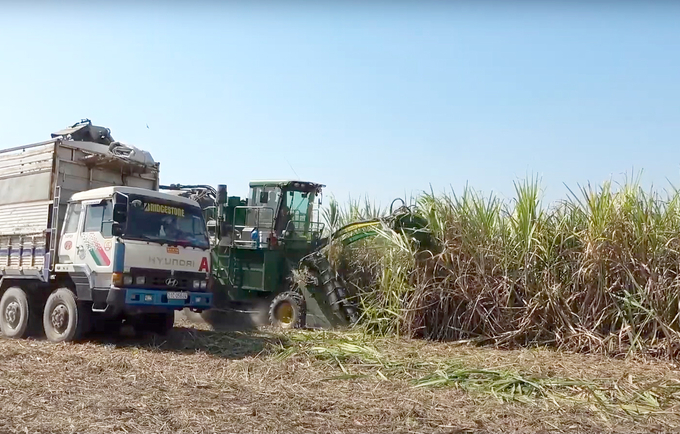
Sugar cane harvesting in Tay Ninh province during the 2022/23 crop. Photo: Son Trang.
The impact of these trade defense measures is evident in the amount of sugar imported into Vietnam. Namely, Vietnam imported nearly 1.6 million tons of sugar in 2020. This figure decreased to approximately 1.5 million tons in 2021, and by 2022, it had further reduced to just over 1.2 million tons.
The reduction in imported sugar has allowed Vietnamese sugar mills to gradually regain their domestic market share in addition to increasing the purchase price of sugar cane for farmers. The purchasing price for raw sugar cane currently ranges from 1.1 to 1.3 million VND per ton, which is equivalent to the prices in other regional sugar cane-producing countries. This price range has led to an expansion in sugar cane production areas as well as an increased yield.
According to the Tay Ninh province's Department of Agriculture and Rural Development, the local sugar cane production area increased by 10.3% to nearly 16,000 hectares during the 2022/23 crop. Sugar mills in Tay Ninh province have raised the purchasing price at the field for 10-CCS sugar cane to 1.14 million VND per ton. Additionally, the local sugar mills have provided assistance in harvesting, incentives, and sugar content insurance. Approximately one month prior to the end of the crop, the sugar mills raised the purchasing price by an additional 50,000 VND per ton, resulting in a maximum sugar cane price of 1,190,000 VND per ton, which is an increase of 9.17% compared to the previous crop.
VSSA affirms that the trade defense measures for the sugar industry are established to combat dumping and subsidies as well as ensure supply and demand stability and market equilibrium. With the application of measures against dumping and subsidies, the domestic sugar market will establish a new price base that accurately reflects the production costs of sugar under fair competition conditions.
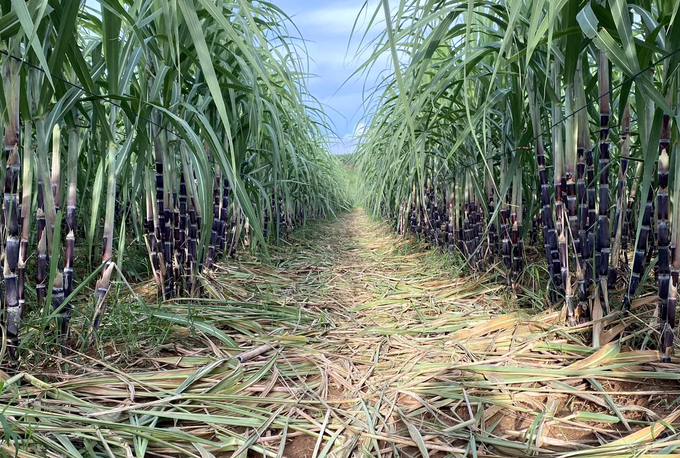
A sugar cane field in Tan Bien district, Tay Ninh province. Photo: Son Trang.
However, upon monitoring the state of sugar imports and customs statistics provided by the General Department of Customs, VSSA discovered certain irregularities in the import of sugar from select ASEAN countries. For instance, the quantity of sugar imported from Indonesia, Laos, and other countries has increased noticeably over the past two years, surpassing the trigger threshold. Accordingly, the threshold allows a member state to take actions to prevent or remedy damages caused by an increase in rice and sugar imports.
On the other hand, sugar imports from Indonesia into Vietnam is also exhibiting signs of dumping. According to customs statistics from the General Department of Customs, the average import price of sugar from Indonesia to Vietnam was measured at 594 USD per ton in 2021. Subsequently, this price point was risen to 664 USD per ton in 2022. The aforementioned import prices of sugar are notably lower compared to the prevailing sugar rates within the Indonesian domestic market. Information available on the official website of the Indonesian Ministry of Trade reveals that the average sugar price in Java was 835 USD per ton in 2021 and 895 USD per metric ton in 2022. Consequently, Indonesia is exporting sugar to Vietnam at a substantially reduced cost when compared to its domestic market prices, with a 41% difference in 2021 and a 34% difference in 2022.
This scenario has prompted VSSA to address the existence of these irregular trade practices, which have been dominant within the sugar industry for several years. These practices have negatively affected the Vietnam's sugar industry. With the implementation of trade defense measures in the Vietnam's sugar industry, domestic sugar prices have experienced a considerable upswing compared to previous years. As a result, fraudulent trade practices within the sugar industry have become increasingly sophisticated and prevalent.
With the goal of enhancing the fight against fraudulent trade practices in the sugar industry, VSSA will establish a monitoring system to collect information on market developments and fraudulent trade activities to provide timely information to relevant authorities. Additionally, VSSA will implement a origin traceability system to help prevent fraudulent trade practices and support governmental agencies in identifying the origins of goods in circulation, distinguishing counterfeit products, illegally imported goods, and fraudulent trade practices.
Translated by Nguyen Hai Long
![Sustainable future for wood industry: [Part 3] Green transformation](https://t.ex-cdn.com/nongnghiep.vn/608w/files/doanhtq/2025/04/01/2558-2129-4jpg-nongnghiep-162120.jpg)
(VAN) One of the solutions for Vietnam's timber industry to achieve sustainable development amid the current challenges is to undergo a green transformation…
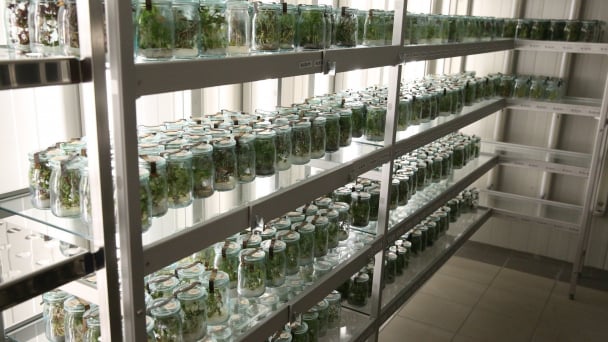
(VAN) Empowering farmers, Indigenous Peoples, local communities and scientists to conserve and use genetic resources is key to resilient agrifood systems.
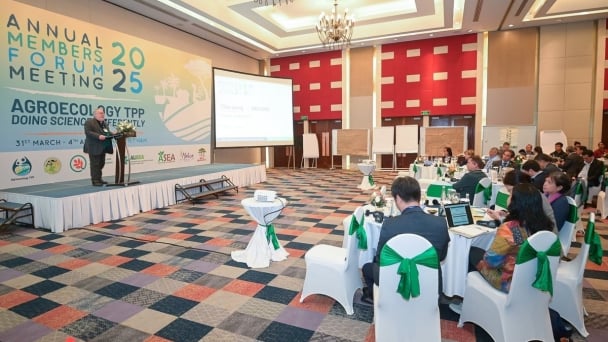
(VAN) Mr. Nguyen Do Anh Tuan, Director of the International Cooperation Department (Ministry of Agriculture and Environment), affirmed that ecological agriculture is a solution for many challenges in the current period.
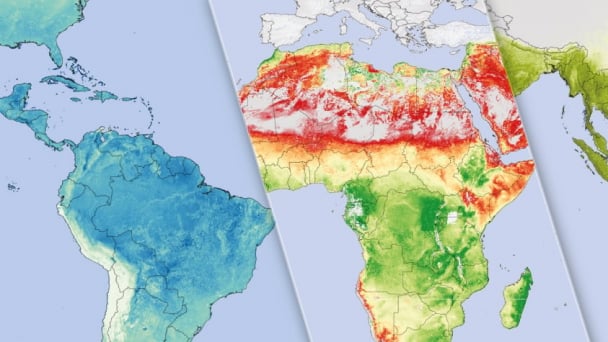
(VAN) The project ‘Drought impact assessment in the Central Highlands’ will leverage remote sensing technology to forecast drought for about 1,500 square kilometers of agricultural production areas.
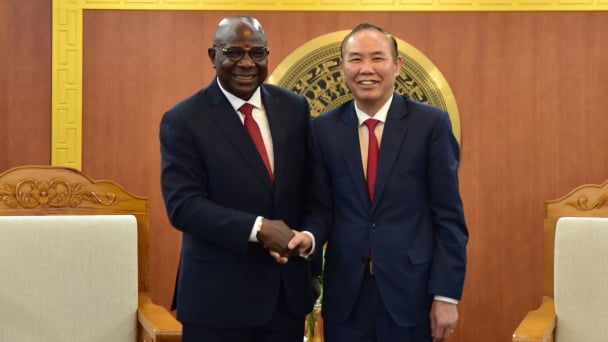
(VAN) The World Bank (WB) will accompany the Ministry of Agriculture and Environment in implementing sustainable fisheries infrastructure development and ensuring livelihoods projects.
![Sustainable future for wood industry: [Part 2] Businesses concern about tax policies](https://t.ex-cdn.com/nongnghiep.vn/608w/files/huytd/2025/03/28/2517-4-160407_111-092943.jpg)
(VAN) In addition to the challenges posed by the EUDR, Vietnam's wood industry is also facing tax policies from the United States, one of its major markets.
![Sustainable future for wood industry: [Part 1] Identifying challenges](https://t.ex-cdn.com/nongnghiep.vn/608w/files/tungvd/2025/03/16/5915-4jpg-nongnghiep-155905.jpg)
(VAN) With the European Union Deforestation Regulation (EUDR) and fluctuations in the global market, Vietnam's wood industry will face numerous challenges in the coming years that must be overcome...